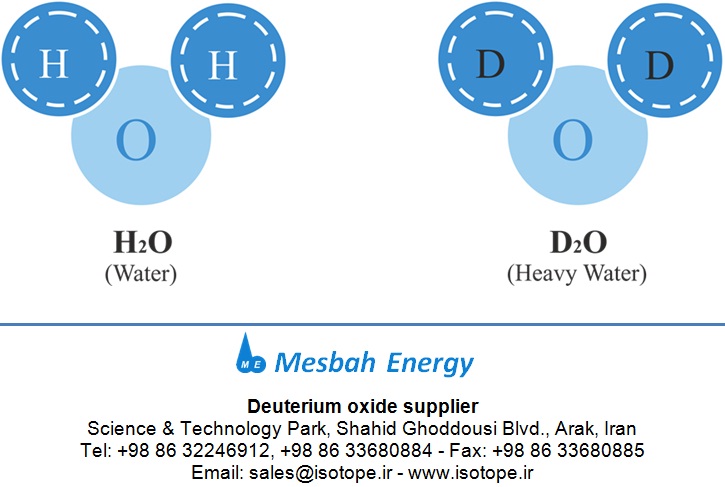Deuterium oxide definition
Deuterium oxide or heavy water (D2O) is a form of water that is composed of deuterium and oxygen. Deuterium, also called heavy hydrogen is an isotope of hydrogen with a nucleus consisting of one proton and one neutron, which is double the mass of the nucleus of ordinary hydrogen. The presence of deuterium gives the chemical different nuclear properties, and the increase of mass gives it different physical and chemical properties compared to normal "light water".
Fig 1. Heavy water and water chemical structures
Ordinary water as obtained from most natural sources contains about one deuterium atom for every 6,760 ordinary hydrogen atoms. and the residual water is thus enriched in deuterium content. The heavy water produced is used as a moderator of neutrons in nuclear power plants. In the laboratory heavy water is employed as an isotopic tracer in studies of chemical and biochemical processes.
Table 1. Physical properties of deuterium oxide
|
Properties |
D2O (Heavy water) |
H2O (Light water) |
|
Freezing point |
3.82 °C (38.88 °F) |
0.0 °C (32 °F) |
|
Boiling point |
101.4 °C (214.5 °F) |
100.0 °C (212 °F) |
|
Density at STP (g/mL) |
1.1056 |
0.9982 |
|
Temp. of maximum density |
11.6 °C |
3.98 °C[10] |
|
Dynamic viscosity (at 20 °C, mPa·s) |
1.2467 |
1.0016 |
|
Surface tension (at 25 °C, N/m) |
0.07187 |
0.07198 |
|
Heat of fusion (kJ/mol) |
6.132 |
6.00678 |
|
Heat of vaporisation (kJ/mol) |
41.521 |
40.657 |
|
pH (at 25 °C) |
7.44 ("pD") |
7.0 |
|
pKb (at 25 °C) |
7.44 ("pKb D2O") |
7.0 |
|
Refractive index (at 20 °C, 0.5893 μm) |
1.32844 |
1.33335 |
Source:
https://www.britannica.com
https://en.wikipedia.org

